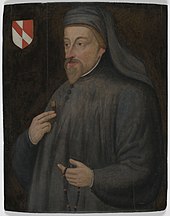Literature, poetry, and philosophy

Early authors such as Bede and Alcuin wrote in Latin.[269] The period of Old English literature provided the epic poem Beowulf and the secular prose of the Anglo-Saxon Chronicle,[270] along with Christian writings such as Judith, Cædmon's Hymn and hagiographies.[269] Following the Norman conquest Latin continued among the educated classes, as well as an Anglo-Norman literature.
Middle English literature emerged with Geoffrey Chaucer, author of The Canterbury Tales, along with Gower, the Pearl Poet and Langland. William of Ockham and Roger Bacon, who were Franciscans, were major philosophers of the Middle Ages. Julian of Norwich, who wrote Revelations of Divine Love, was a prominent Christian mystic. With the English Renaissance literature in the Early Modern English style appeared. William Shakespeare, whose works include Hamlet, Romeo and Juliet, Macbeth, and A Midsummer Night's Dream, remains one of the most championed authors in English literature.[271]
Christopher Marlowe, Edmund Spenser, Philip Sydney, Thomas Kyd, John Donne, and Ben Jonson are other established authors of the Elizabethan age.[272] Francis Bacon and Thomas Hobbes wrote on empiricism and materialism, including scientific method and social contract.[272] Filmer wrote on the Divine Right of Kings. Marvell was the best-known poet of the Commonwealth,[273] while John Milton authored Paradise Lost during the Restoration.
Some of the most prominent philosophers of the Enlightenment were John Locke, Thomas Paine, Samuel Johnson and Jeremy Bentham. More radical elements were later countered by Edmund Burke who is regarded as the founder of conservatism.[275] The poet Alexander Pope with his satirical verse became well regarded. The English played a significant role in romanticism: Samuel Taylor Coleridge, Lord Byron, John Keats, Mary Shelley, Percy Bysshe Shelley, William Blake and William Wordsworth were major figures.[276]
In response to the Industrial Revolution, agrarian writers sought a way between liberty and tradition; William Cobbett, G. K. Chesterton and Hilaire Belloc were main exponents, while the founder of guild socialism, Arthur Penty, and cooperative movement advocate G. D. H. Cole are somewhat related.[277] Empiricism continued through John Stuart Mill and Bertrand Russell, while Bernard Williams was involved in analytics. Authors from around the Victorian era include Charles Dickens, the Brontë sisters, Jane Austen, George Eliot, Rudyard Kipling, Thomas Hardy, H. G. Wells and Lewis Carroll.[278] Since then England has continued to produce novelists such as George Orwell, D. H. Lawrence, Virginia Woolf, C. S. Lewis, Enid Blyton, Aldous Huxley, Agatha Christie, Terry Pratchett, J. R. R. Tolkien, and J. K. Rowling.[279]
